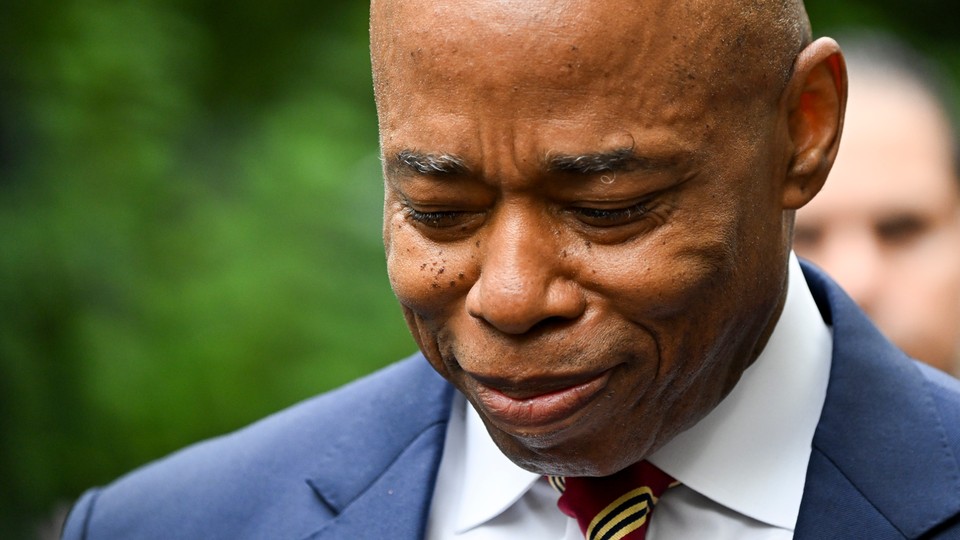An Era of Shamelessness in American Politics
6 min read
This is an edition of The Atlantic Daily, a newsletter that guides you through the biggest stories of the day, helps you discover new ideas, and recommends the best in culture. Sign up for it here.
Earlier today, Mayor Eric Adams pleaded not guilty to the five federal counts unveiled this week in a damning 57-page indictment that alleges that he engaged in a quid pro quo corruption scheme with Turkish nationals, among other campaign-funding violations.
At a press conference yesterday in front of Gracie Mansion, the official mayoral residence on the Upper East Side of Manhattan, Adams cycled through some standard denials, telling reporters that “everyone who knows me knows that I follow the campaign rules and I follow the law.” But he has also struck a defiant tone, referring to the “demonizing” he has supposedly dealt with over the past 10 months, since investigations into his 2021 election campaign became public and scandals started to engulf his administration. “I always knew that if I stood my ground for all of you that I would be a target—and a target I became,” he said in a video statement to New Yorkers on Wednesday evening, before his indictment was announced. “I will fight these injustices with every ounce of my strength and my spirit … If I am charged, I know I am innocent.”
Adams, of course, is innocent until proven guilty in a court of law. But his claims of innocence seem to hinge on his stance that he is the victim of a targeted attack—a narrative that fits into what my colleague David Graham calls “a trend of growing shamelessness” among American politicians accused of wrongdoing. There was once a time when “a major scandal was a career ender” for an elected official, David, who covers politics, told me, but in recent decades, notable politicians have refused to step down, some of them “remaining defiant and insisting they’re victims.” In the 1990s, David reminded me, Bill Clinton apologized for having an affair, but he didn’t resign—and he accused Republicans of targeting him.
More recently, Senator Bob Menendez was accused last year of a corruption scheme that involved foreign influence. There was some damning evidence: Authorities found gold bars in his home. Menendez responded by saying that “the government is engaged in primitive hunting, by which the predator chases its prey until it’s exhausted and then kills it”; he also suggested that his rivals were “rushing to judge a Latino.” Menendez was found guilty on all counts and resigned earlier this year. Donald Trump’s attempts to blame others for his multiple indictments—including frequent accusations of “witch hunts”—have been an exemplar of this genre of behavior. But if the Menendez example is any indication, David said, “maybe only Trump can really pull this off.”
Even before the Trump era, New York politicians were known for this sort of deflection, my colleague Russell Berman wrote this morning: “With few exceptions, New Yorkers accused of wrongdoing have left neither quickly nor quietly.” Adams is the first sitting mayor in modern New York City history to be indicted, and these are the first charges he himself has faced as an adult. But suggestions of impropriety, and accusations that he has misused his position to the benefit of donors and allies, have followed him throughout his political career. He has consistently taken a posture of framing himself as the victim in such circumstances. In 2021, when The New York Times reported a story about his history of pushing ethical boundaries, Adams denied the accusations, saying in a statement that “Black candidates for office are often held to a higher, unfair standard—especially those from lower-income backgrounds such as myself.” Adams is also a practiced deflector of all sorts of criticism, using frequently puzzling but memorable clapbacks:Haters, he has suggested on various occasions over the years, will become waiters at the table of success.
Adams still has some supporters, but his detractors are growing in number. Even before the indictment dropped yesterday, New York politicians including Representative Alexandria Ocasio-Cortez were calling on him to resign. His trial may come as soon as early next year. In the meantime, Governor Kathy Hochul has the power to oust him from office, though she has given no clear indication that she will do so.
If Adams does step down during this term, by his own choice or someone else’s, his seat will open up in a special election. Local officials have already started vying for the job, and another New Yorker who resigned not so quietly in the midst of his own scandal is reportedly considering running: former Governor Andrew Cuomo. Adams has long courted the spotlight, David noted, and that may make it harder for him to ride this scandal out. Even if he’s done in politics, David said, “you can imagine him thriving on TV.”
Related:
- Don’t assume that Eric Adams is going anywhere.
- How it all went wrong for Eric Adams
Here are three new stories from The Atlantic:
- Nasrallah’s folly
- America’s hurricane luck is running out.
- How defense experts got Ukraine wrong
Today’s News
- At least 40 people died and more than 3 million people do not have power after Hurricane Helene made landfall in Florida last night.
- The Israeli military struck multiple residential buildings near Beirut, which it says were above the central headquarters of Hezbollah. The attacks killed at least two people and injured 76 people, according to Lebanon’s health ministry.
- The Justice Department charged three Iranian operatives with hacking members of Donald Trump’s presidential campaign.
Dispatches
- Work in Progress: Eliminating degree requirements for jobs is very popular with voters but would do almost nothing to help workers who don’t have a college diploma, David Deming argues.
- Atlantic Intelligence: Disaster is brewing on dark-web forums and in schools, Matteo Wong writes. Generative AI is being used to create sexually explicit images and videos of children, likely thousands a day.
- The Books Briefing: Millennials are worrying about getting old, Boris Kachka writes. Gen X can relate.
Explore all of our newsletters here.
Evening Read

A Question That Demands an Answer
By George Packer
A Russian Kinzhal ballistic missile, fired from a MiG-31K aircraft about 200 miles from the border with Ukraine and 700 miles from Lviv, had hit an apartment in a civilian neighborhood. The apartment was the home of the Bazylevych family: Yaroslav Bazylevych; his wife, Evgeniya; and their three daughters, Yaryna, 21, Darya, 18, and Emilia, 7. Yaroslav staggered out of the damaged building, badly injured, but struggled to return inside while emergency personnel restrained him. He had lost his entire family.
Read the full article.
More From The Atlantic
- Remember that DNA you gave 23andMe?
- AI is a language microwave.
- Malcolm Gladwell, meet Mark Zuckerberg.
Culture Break

Watch (or skip).Megalopolis (out now in theaters) is the culmination of Francis Ford Coppola’s fantasy of film’s technological potential. The result is a maximalist mess that tries to cover too much ground, Shirley Li writes.
Read. These five books can conjure entirely new worlds for readers.
Play our daily crossword.
Stephanie Bai contributed to this newsletter.
When you buy a book using a link in this newsletter, we receive a commission. Thank you for supporting The Atlantic.



